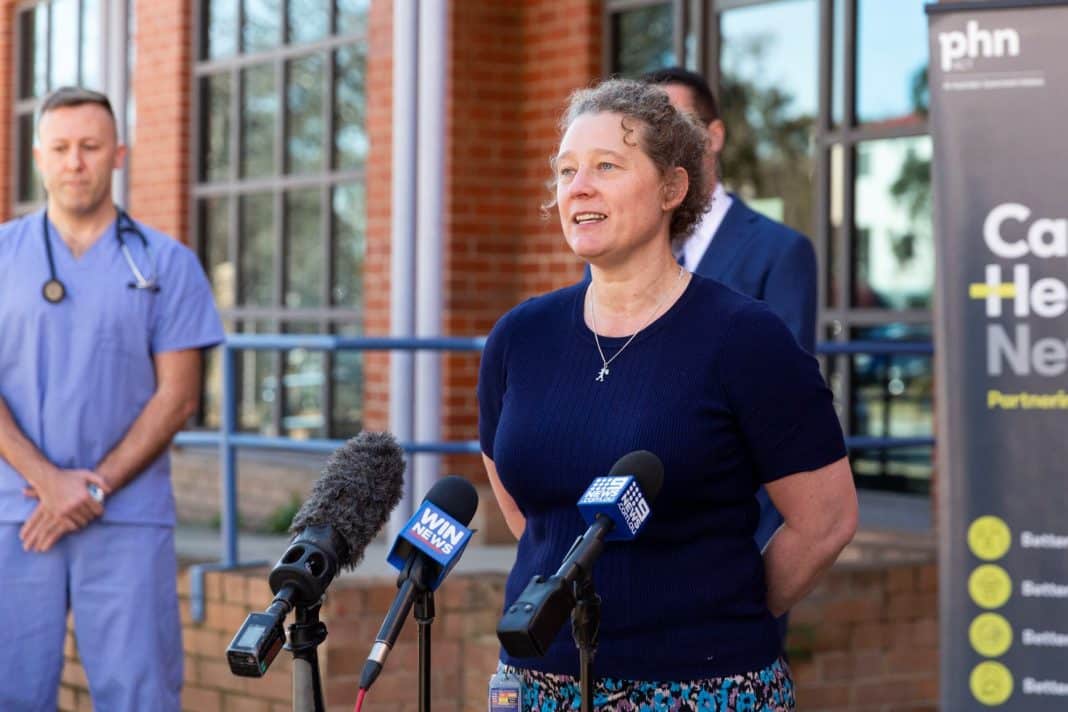In the lead-up to the ACT’s first Delta case in August 2021, Chief Health Officer Dr Kerryn Coleman remembers a feeling that it was only a matter of time.
- Update: ACT to enter lockdown at 5pm 12 August (12 August 2021)
“We were tracking the cases in the surrounding parts of NSW on large maps, and we could feel it getting closer and closer. I described it at the time like waiting to start a race, where you are leaning forward, ready to spring into action, waiting for the gun to go off.”
On Thursday 12 August last year, the ACT entered lockdown: originally meant to be seven days, it ended up being nine weeks. Rates of mental illness and depression increased, and several businesses closed for good.
Nevertheless, Dr Coleman thinks: “We made the right decisions at the right times to help protect our community as much as possible”.
“The lockdown was essential at the time, given the potentially devastating consequences of an outbreak of the Delta variant in an unvaccinated community,” Dr Coleman said. “Looking back, I think we did a fantastic job as a community to really limit the spread of COVID-19 until we managed to reach such high levels of vaccination.”
By the end of October, Canberra had become one of the most vaccinated cities in the world, with 90 per cent of its eligible residents vaccinated.
Dr Coleman said she was “extremely proud” of the Canberra community’s response.
“There is no doubt that our eagerness to get vaccinated helped protect our community and helped us come out of lockdown as quickly as possible.”
Canberrans’ high levels of education and the ACT’s small size affected the community’s willingness to get vaccinated, she believes – but she also thinks Canberrans feel great responsibility for their community.
Dr Coleman also paid tribute to the dedication of the ACT Government staff working on the pandemic response.
“There were some really long days and some difficult and challenging issues to deal with, but the team really pulled together to do what we could to protect Canberrans,” she said.
A year later, she thinks Canberra is back to a more normal life. “The lockdown is finished, most social restrictions are gone, and Canberrans are mostly back doing the things they love. People are back at work, going to cafes and restaurants, spending time with family and friends, and of course we are travelling again.”
But COVID-19 is still widespread. As of today, there are more than 2,400 active cases, 287 new cases, and 135 people in hospital (down from 4,420 active cases the week before).
“We are currently at a tricky point in the pandemic,” Dr Coleman said. “Although case numbers are dropping, and that is wonderful to see, we still need people to realise that COVID-19 is still present in our community.”
She urged the public, particularly those at risk of severe outcomes from COVID-19, to still practise those COVID-smart behaviours to reduce their chances of getting COVID-19.
Find out if you are eligible for antivirals if you get COVID, and have a plan in place with your healthcare provider to access them if required, Dr Coleman said. Stay at home and get tested when sick. Register your positive RAT. Know your treatment options, talk to your healthcare professional in advance. Be up-to-date with your vaccinations. She encouraged anyone eligible for their second booster dose to get it as soon as they become eligible. Third and fourth doses make a difference in keeping people out of the ICU, she said. Wear a mask indoors or in crowded settings, and try to maintain a safe distance where you can. Practise good hand hygiene.
High levels of case numbers affected workplaces across the ACT. “We see the significant strain that is caused across the public and private sectors of large numbers of people being unavailable for work because they or people they need to care for are unwell,” Dr Coleman said.
“This impact has been especially noticeable in the health system where COVID-19 and other respiratory illnesses have led to both staff shortages and an increased workload for our dedicated workforce.”
COVID-19 is not going away, Dr Coleman said. “However, I think we are in a fairly good place right now, as it increasingly looks like we have moved past the peak of the most recent wave.
“While we will probably have more waves in the future, we don’t really know what those will look like or when they are likely to take place. Will it be six months, nine months, or two months? That’s still too uncertain to know for sure.
“What we do know is that we are in a very different place to where we were a year ago in terms of our ability to help minimise the impact on the community.”
ALSO READ:
- Emma Davidson: ACT lockdown ‘burned into my memory’ (12 August 2022)
- Canberra businesses face post-lockdown challenges (15 August 2022)
Canberra Daily would love to hear from you about a story idea in the Canberra and surrounding region. Click here to submit a news tip.



